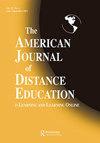Exploring Supports to Enhance Learning from Online Virtual Experiments in Science
IF 1.3
Q2 EDUCATION & EDUCATIONAL RESEARCH
引用次数: 0
Abstract
ABSTRACTVirtual experiments offer opportunities for students to engage in the scientific process and observe scientific phenomena. However, virtual experiments are not always effective for learning. The current study examined how two small manipulations might support better learning from virtual experiments and the extent to which this varied across learners. Undergraduates in an introductory biology class (n = 415) were randomly assigned to a 2(agency: active, passive) × 2(strategy instruction: control condition, control of variables [CVS] strategy instruction) between-subjects design and completed two prior knowledge tests (topic, general science). Comprehension tests results indicated that the students had relatively good comprehension of the experiment content, but that performance was driven by prior knowledge. Although there were no significant effects of the agency or strategy instruction manipulations, exploratory interactions suggest a need to further investigate which types of virtual experiment supports might be most beneficial for different learners.KEYWORDS: Science simulationsvirtual science experimentsprior knowledgelearner guidancecomprehension Disclosure statementNo potential conflict of interest was reported by the author(s).Notes1 Per IRB requirements, students were allowed to complete the study for extra credit without consenting to have their data used in this research study. Students who selected “no” on the informed consent form were given credit and their data was removed from the data files.Additional informationFundingThis research was supported in part by funding from the Spencer Foundation (201900217) and the American Psychological Association (APA) Division 15. The research reported herein was also supported by the Institute of Education Sciences, U.S. Department of Education, through Grant R305B200020 to Florida State University. The opinions expressed are those of the authors and do not represent views of the Spencer Foundation, APA, or the Institute of Education Sciences or the U.S. Department of Education.探索科学在线虚拟实验促进学习的支持手段
摘要虚拟实验为学生参与科学过程和观察科学现象提供了机会。然而,虚拟实验并不总是有效的学习。目前的研究考察了两个小操作如何支持更好地从虚拟实验中学习,以及学习者之间的差异程度。采用2(主动、被动)× 2(策略指导:控制条件、变量控制[CVS]策略指导)的被试设计,随机抽取415名生物学导论班本科生,完成两项先验知识测试(主题、普通科学)。理解测试结果表明,学生对实验内容有较好的理解,但这种理解受先验知识的驱动。尽管代理或策略教学操作没有显著影响,探索性互动表明需要进一步研究哪种类型的虚拟实验支持可能对不同的学习者最有益。关键词:科学仿真虚拟科学实验先验知识学习者指导理解披露声明作者未报告潜在利益冲突注1根据IRB的要求,学生可以在不同意将其数据用于本研究的情况下完成研究以获得额外学分。在知情同意书上选择“否”的学生将获得学分,他们的数据将从数据文件中删除。本研究得到了斯宾塞基金会(201900217)和美国心理学会(APA)第15分部的部分资助。本文报告的研究也得到了美国教育部教育科学研究所的支持,通过拨款R305B200020给佛罗里达州立大学。本文仅代表作者个人观点,不代表斯宾塞基金会、美国心理学协会、教育科学研究所或美国教育部的观点。
本文章由计算机程序翻译,如有差异,请以英文原文为准。
求助全文
约1分钟内获得全文
求助全文
来源期刊

American Journal of Distance Education
EDUCATION & EDUCATIONAL RESEARCH-
CiteScore
7.20
自引率
3.10%
发文量
30
 求助内容:
求助内容: 应助结果提醒方式:
应助结果提醒方式:


